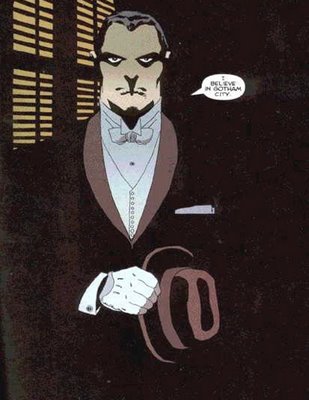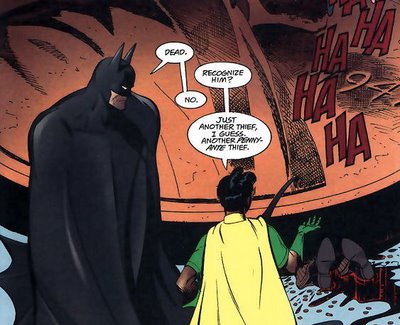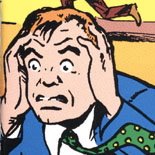Plutocrat
In my People's Superman post, I mentioned that Superman being an anti-aristocratic hero is an exception to the rule, that most superheroes are aristocratic in both background and behavior, and the best example of that is...
Batman.
Yes, Batman. Batman isn't just "the man," Bruce Wayne is also The Man. He's a rich, white, handsome man who comes from an old money family and is the main employer in Gotham. He owns half the property in the city. In a very real sense, Gotham belongs to him, and he inherited all of it.
Batman isn't just "the man," Bruce Wayne is also The Man. He's a rich, white, handsome man who comes from an old money family and is the main employer in Gotham. He owns half the property in the city. In a very real sense, Gotham belongs to him, and he inherited all of it.
Accordingly, Batman has an enormous sense of entitlement. Batman just assumes he's right in every situation. It's his city. If he doesn't like you, he'll tell you to leave. If Batman thinks you're guilty of a crime, he'll put on his pointed white hood black mask and beat the crap out of you. Laws? Civil rights? Due process? Those are for other people. Yes, the people may have elected a mayor, pay taxes to employ the police. Batman could work with them, but they're all corrupt, weak, not as good as him. (Except Gordon. Batman has generously determined that Gordon is worthy to contacted, though he always disappears before Gordon's done talking, just to remind Gordon who's the bitch in this relationship.)
And look at who he fights! Superman fights intergalactic dictators, evil monopolists, generals, and dark gods. Batman fights psychotics, anarchists, mob bosses, the mentally frail, and environmentalists. Superman fights those who would impose their version of order on the world. Batman fights those who would unbalance the order he imposes on Gotham. Consider the Penguin. He's a criminal, a thug. But what really distinguishes him is his pretensions to being upper class. The tux, the monocle. The fine wine and fine women. Running for mayor. He tries to insinuate himself with actual socialites, some of whom are attracted to his air of danger, but most of whom are repulsed by his "classless" manners. And when his envy and resentment of his "betters" turns to violence, Bruce steps in to teach him his place.
Consider the Penguin. He's a criminal, a thug. But what really distinguishes him is his pretensions to being upper class. The tux, the monocle. The fine wine and fine women. Running for mayor. He tries to insinuate himself with actual socialites, some of whom are attracted to his air of danger, but most of whom are repulsed by his "classless" manners. And when his envy and resentment of his "betters" turns to violence, Bruce steps in to teach him his place.
And it's not just Mr. Cobblepot. Hugo Strange, Black Mask, Facade, Catwoman, all villains from lower class backgrounds who want to be upper class, who want to hobnob with the rich and famous at one of Bruce's fabulous fetes, but just can't pull it off (well, Catwoman can, but Selina's in a class all by herself). Even Harvey Dent, before he became Two-Face, envied and resented his friend Bruce Wayne, because Wayne had money and Harvey had to work for everything he got. And then there's the villains who have a vendetta against C.E.O.'s of powerful corporations, either for revenge (Mr. Freeze, Clayface) or out of principle (Ra's al Ghul, Poison Ivy). There's a class war going on in Gotham, and Batman has taken the side of the rich.
Like Superman, there's an Arthurian "king-in-hiding" element to Batman's origin. "Banished" from Gotham by the death of his parents, Bruce Wayne returns to redeem his land and reclaim his throne. But instead of reclaiming it from usurping uncle or foreign invader, Batman must take Gotham back from a rising underclass.
And Batman doesn't even like the upper class he belongs to, either! Shallow, petty, boring, vain. They know nothing of the pain and suffering he sees every night when he hunts killers through the slums of Gotham, every day when he closes his eyes. He mockingly refers to himself as a "plutocrat" in last week's JLA: Classified, dismissing both value of plutocrats and the intelligence of a dictator who courts them. But does he dislike his wealthy peers because they don't appreciate how wealthy they are? Or is it because they aren't wealthy enough to appreciate how much responsibility he has?
And even if he thinks they're upper class twits, he really doesn't do anything about it. He leaves them in place, protects them from harm, flirts with and beds them. They're not the bad guys, after all. It's all those poor evil people. The one's who keep crashing the gate, who happened to be accidentally hurt in the hunt for profit. No reason Batman should try to protect them, keep them from getting crushed under the weight of capitalism.
They're just "penny-ante". And Bruce is a plutocrat!



7 comments:
[Sorry in advance for the long response.]
...Batman must take Gotham back from a rising underclass.
Hmmm ... I don't know. Conventional wisdom has Bruce/Batman taking Gotham back from gangsters and (as of "Year One," if not before) official corruption. This judgment of "corruption" isn't some subjective rationalization on Batman's part, at least not at first. Not to be flip, because I'm hardly a sociologist, but can it really be an underclass if it pulls the city's strings?
To me, "Batman" is a response to the failure of the establishment. Bruce sees that the government can't stop the criminals from preying on the regular folks, and because of his elevated position in society, considers it his responsibility to do what he can to make things right. However, he's still got some psychological issues to work out over the deaths of his parents, and has spent the past dozen or so years learning how to beat people up.
It all comes together in this grand piece of theater whereby Bruce shows the capitalists-run-wild that they might have co-opted the systems designed to keep their avarice in check, but they can't stop a creature of the night. In a very real way, "Batman" is about subverting ordinary societal structures, because those structures have been turned against their intended beneficiaries. Yes, he's trying to impose order, but by restoring what should be a normal (and, I daresay, liberal) status quo.
In this light, the Joker is an ideal foil, because he doesn't see any value in those societal structures -- they're all a cruel trick society plays on itself -- and takes great delight in subverting them.
The problem with all of this, obviously, comes when Gotham is eventually cleaned up. Whenever that is -- and it's probably come already, in current continuity -- I think you get the Batman of the '50s through (arguably) the '90s, who was a civic fixture, not an urban legend. Accordingly, when Batman himself becomes part of the Estabilshment, I'd expect some soul-searching about whether the crusade is still appropriate. Even in the Batman Vs. Dirty Hippies stories of the '70s, wasn't there some of that?
The notion that it's all played out to keep the upper-class twits in power is a fine satirical thesis, and it would make a good story. I'm just not sure how much the texts support it.
I'm with Tom. I think there's something in what you're saying, but you're pushing the argument (entertainingly!) further than it will go.
One point that I was waiting for you to make, but you didn't: Robin. The original Robin was about as lower-class as you could get. He was a carny brat! But Batman took him in and made him his greatest ally.
No need to apologize. I LIKE long, well reasoned rebuttals.
can it really be an underclass if it pulls the city's strings?
"Underclass" in terms of breeding and background, not social power. In the real world, no, of course the people who run the government can't be considered "under" anything. But in the neo-aristocracy of Gotham with more easily identified bad guys and good guys, where the criminal plebeians are taking over from the morally upstanding old money patricians like Wayne and Leslie Thompson, hell yeah they are lower.
To me, "Batman" is a response to the failure of the establishment.
Granted. It's what makes him a vigilante. And I'll do you one better. Vigilantism is a response to the failure of democracy.
I'm thinking of Dark Knight Returns, of course. The citizens of Gotham could defend themselves, if they weren't so willing to believe spineless politicians on TV or be cowed by demagogic psychotics like the Mutant Leader or the Joker. And if the people refuse to stand up for themselves, well Bruce is just going to have to take over the city and run it himself. AND IT WORKS! (which is why the failed government tells Superman to bring Batman in, which is why Superman lets Batman escape at the end.)
Yes, he's trying to impose order, but by restoring what should be a normal (and, I daresay, liberal) status quo.
Azerrello once described Batman, and all superheroes, as people who use fascist means to achieve socialist ends. That sounds about right.
In this light, the Joker is an ideal foil
The Killing Joke Joker, yeah, I see that. I left him out because he doesn't usually exhibit the prominent social climbing tendencies of Catwoman or the Penguin, or the focused anti-corporate revolution of Poison Ivy or Anarchy. The Joker's such an insane nihilist that he attacks everybody.
Quite egalitarian, that Joker.
The problem with all of this, obviously, comes when Gotham is eventually cleaned up.
Yeah, exactly. Masked vigilantism in the name of social revolution could be justified. Hooded justice to support the status quo is HIGHLY DISTRESSING!
The notion that it's all played out to keep the upper-class twits in power is a fine satirical thesis, and it would make a good story.
I wouldn't say that it's "all" about keeping the twits in power. If the twits turn bad, he'll take them out as well. But if it comes to a clash between the twit and the poor schlub they screwed over and disfigured, Batman tends to side with the twit (to his disgust, yes, but he'll do it).
Certainly, plutocrat class warrior isn't the defining feature of Batman (which I'm guessing is badassery in the name of dark vengeance), just an interesting aspect.
AND
Is Robin (Dick Grayson) lower class? Is he a poor kid who grew up in a tent, or a child celebrity from a world famous family of performers? And is Batman adoption of Robin leveling the playing field, or is turn Dick into his "ward" an act of noblise oblige?
"Underclass" in terms of breeding and background, not social power.
Okay, that makes more sense, but I don't know if "underclass" is quite the right term. "Social inferior," maybe?
Again, though, the argument seems to equate the Waynes' (and their friends') high social status with them being "good," while it assumes that the (Gillian) Loebs, Falcones, Maronis, Zuccos, Bertinellis, etc., must have a lower social status because they are bad. It may be the case that all (or most of) the bad, corrupt people swarmed into Gotham after the Waynes were killed, and/or clambered up from "below" to take over the institutions of democracy, but it also seems to me that we've seen examples of the Bad Rich from back in the Waynes' day.
I'm thinking specifically of Lew Moxon, the mobster who hired Joe Chill to kill Thomas Wayne. I'm sure Dr. Wayne didn't care for Moxon, but it was because he was a criminal, not necessarily because he came from the streets. When Ed Brubaker brought Moxon back a few years ago, he established that Moxon's daughter and young Bruce used to play together. Likewise, wasn't the villainous matriarch of the Batman: Family miniseries friends with Martha (Kane) Wayne?
There's a fine line between saying Bruce wants Gotham run by his parents' social caste, and feels "entitled" to rule by virtue of his succession to that caste; and saying the Waynes et al. gave Bruce a good example of how the ultra-wealthy should act responsibly.
As for vigilantism responding to the failure of democracy, there's part of that in the Batman setup (and certainly a lot of apathy in Dark Knight), but again, I think in general it's more a failure and/or subversion of the institutions of democracy. I don't picture the average Gothamite as being content with gangsters controlling everything -- more like the gangsters have really gotten entrenched by the time Batman comes along.
But if it comes to a clash between the twit and the poor schlub they screwed over and disfigured, Batman tends to side with the twit (to his disgust, yes, but he'll do it).
I was going to disagree with this entirely, but really, it depends. I know there have been a few Batman/Green Arrow "full and frank discussions" about Breaking The Law vs. Protecting The Fat Cats, but I think those exist mostly to shore up Ollie's lefty bona fides and make Batman (or whoever) look like a fascist in comparison. (It helps insulate him from being a sexist. ;))
Now, if you're talking about the "twit" who ran the chemical plant where the Red Hood was disfigured, then yes, I'd say Batman has consistently sided with the twit, but not primarily because the disfigured schlub was a social inferior.
In "Contagion," though, when the twits barricaded themselves in their club to keep the diseased riffraff out, Batman wasn't on the twits' side. (To be fair, the disease wasn't the twits' fault, it was Ra's al Ghul's.) Again, the way I remember the texts having gone generally -- and this may be my own lefty rationalization -- both Bruce and Batman stick up for the schlubs.
Finally, I don't think the Flying Graysons were all that famous or wealthy; otherwise, why would the circus have been susceptible to Zucco's protection racket?
The Azzarello quote reminds me of Steve Englehart's take on Batman: basically, Batman only works if he's right all the time; and lucky for him, he is. Frank Miller was the first writer I remember who said that Batman only works in a corrupt Gotham, which is part of the same argument.
Doesn't it follow, though, that once Batman does become part of the Establishment, he stops being a fascist? That's why the police commissioner can threaten him with taking away his special deputy status -- once Batman loses that, he's subject to being arrested just like any other lawbreaker.
Where's Mark Millar when you need him...?
P.S. Despite all that, I still think having a Bat-Knight collar Fat Albert and the Cosby Kids in Kingdom Come #1 was inexcusable.
Even if some of them are like school in the summertime.
Ah, the pleasures of debating the interpretation of a character that's been in print for 70 years in multiple, often contradictory versions... you drawing examples from the Brubaker era and Year One, me from Dark Knight Returns and the cartoon. There's a lot in your response I agree with and a lot I don't, but I'll stick to the crux.
Doesn't it follow, though, that once Batman does become part of the Establishment, he stops being a fascist?
If he were truly just a part of the establishment, under the control of Gordon who is himself accountable to the Mayor, and the mayor to the voters, yes. As written, no. Gordon and the Gotham Police need Batman more than he needs them. Except for use of the Bat-Signal, Batman calls all the shots in that "partnership".
In fact, it's when he becomes the establishment that he becomes a fascist. He's accountable to no one, respects the rights of no one, disappears people from their homes. He may listen to his advisors but he will not let anyone, certainly not the law, overrule his will.
The police can threaten to arrest him, AND OCCASIONALLY HAVE TRIED (as recently as post-War Games). But let's face facts, he's Batman. He's not going to jail unless he turns himself in, and that ain't happening. (Silver Age, okay, yeah, he probably would. But then he'd fight a Venusian.)
CRYPTOCURRENCY TRACKING & RERCOVERY SERVICES BY A RECOVERY EXPERT - BLISS PARADOX RECOVERY FIRM
Read this piece carefully so you can know what to do anytime you get stuck with any crypto investment scam here or elsewhere. Victims will require to consult a reliable and reputable recovery expert for assistance, in that case, I recommend BLISSPARADOXRECOVERY. According to some reviews and testimonials I found, this recovery firm has been doing the good work of helping victims to restore any stolen crypto asset, surprisingly, people are not being enlightened about it. Matter of fact, they did saved me from losing over $135,000 worth B T C to some fake investment broker I came across Telegram.
Every recovery step came with evidence and proof making them reliable and reputable. Help yourself by reaching out to them by any available means.
EMAIL: Blissparadoxrecovery@aol.com,
Blissparadoxrecovery@fastservice.com,
TELEGRAM: Blissparadoxrecovery
WHATSAPP: +1 9255963791
SIGNAL: +1 7373703513
Post a Comment